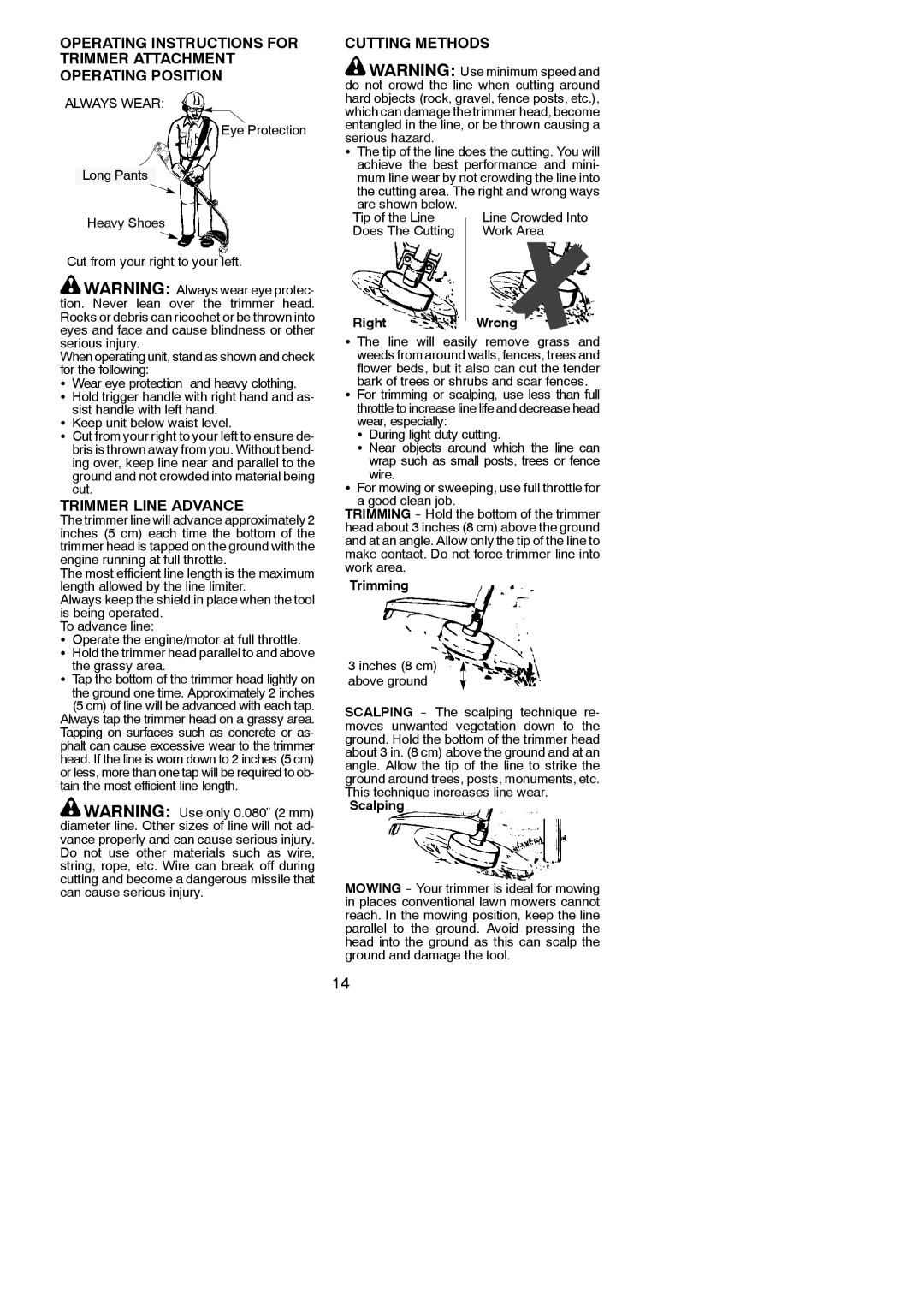
OPERATING INSTRUCTIONS FOR TRIMMER ATTACHMENT OPERATING POSITION
ALWAYS WEAR:
Eye Protection
Long Pants
Heavy Shoes
Cut from your right to your left.
![]() WARNING: Always wear eye protec- tion. Never lean over the trimmer head. Rocks or debris can ricochet or be thrown into eyes and face and cause blindness or other serious injury.
WARNING: Always wear eye protec- tion. Never lean over the trimmer head. Rocks or debris can ricochet or be thrown into eyes and face and cause blindness or other serious injury.
When operating unit, stand as shown and check for the following:
SWear eye protection and heavy clothing.
SHold trigger handle with right hand and as- sist handle with left hand.
SKeep unit below waist level.
SCut from your right to your left to ensure de- bris is thrown away from you. Without bend- ing over, keep line near and parallel to the ground and not crowded into material being cut.
TRIMMER LINE ADVANCE
The trimmer line will advance approximately 2 inches (5 cm) each time the bottom of the trimmer head is tapped on the ground with the engine running at full throttle.
The most efficient line length is the maximum length allowed by the line limiter.
Always keep the shield in place when the tool is being operated.
To advance line:
SOperate the engine/motor at full throttle.
SHold the trimmer head parallel to and above the grassy area.
STap the bottom of the trimmer head lightly on
the ground one time. Approximately 2 inches (5 cm) of line will be advanced with each tap.
Always tap the trimmer head on a grassy area. Tapping on surfaces such as concrete or as- phalt can cause excessive wear to the trimmer head. If the line is worn down to 2 inches (5 cm) or less, more than one tap will be required to ob- tain the most efficient line length.
![]() WARNING: Use only 0.080” (2 mm) diameter line. Other sizes of line will not ad- vance properly and can cause serious injury. Do not use other materials such as wire, string, rope, etc. Wire can break off during cutting and become a dangerous missile that can cause serious injury.
WARNING: Use only 0.080” (2 mm) diameter line. Other sizes of line will not ad- vance properly and can cause serious injury. Do not use other materials such as wire, string, rope, etc. Wire can break off during cutting and become a dangerous missile that can cause serious injury.
CUTTING METHODS
![]() WARNING: Use minimum speed and do not crowd the line when cutting around hard objects (rock, gravel, fence posts, etc.), which can damage the trimmer head, become entangled in the line, or be thrown causing a serious hazard.
WARNING: Use minimum speed and do not crowd the line when cutting around hard objects (rock, gravel, fence posts, etc.), which can damage the trimmer head, become entangled in the line, or be thrown causing a serious hazard.
SThe tip of the line does the cutting. You will achieve the best performance and mini- mum line wear by not crowding the line into the cutting area. The right and wrong ways
are shown below. |
|
|
Tip of the Line |
| Line Crowded Into |
Does The Cutting |
| Work Area |
|
|
|
RightWrong
S The line will easily remove grass and weeds from around walls, fences, trees and flower beds, but it also can cut the tender bark of trees or shrubs and scar fences.
SFor trimming or scalping, use less than full throttle to increase line life and decrease head wear, especially:
S During light duty cutting.
S Near objects around which the line can wrap such as small posts, trees or fence
wire.
SFor mowing or sweeping, use full throttle for
a good clean job.
TRIMMING
Trimming
3 inches (8 cm) above ground
SCALPING
Scalping
MOWING
14
